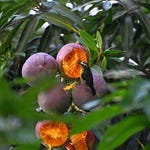As I write this study article, the “tariff-war” between USA and Canada, and the rest of the world, continues to rage. Many grocery stores in Canada now clearly show, alongside the pricing, a maple leaf - to indicate groceries made or grown in Canada. Like many other Canadians, I have taken to carefully examining labels to confirm whether the item I am about to purchase might be putting money into the USA economy.
Bananas from Peru, avocados from Mexico, greenhouse grown in Canada: cucumbers, tomatoes, lettuce. I’ve stopped buying strawberries, because they seem to be coming from California. But I would be willing to bet that the farm workers picking those strawberries are migrant workers, probably from Mexico or the Caribbean. So when I boycott this purchase as an act of economic resistance, am I loving that immigrant farm worker as I love myself?
This week’s study looks at migrant farm workers, and some of the economies of scale that we might not think about when we are seeking to buy local. The podcast article can be found in full print here. We will follow a similar process as the last two weeks.
Noticing Our Responses - Experiencing:
As we did with our previous studies, I invite you to listen or read the post entitled “United Nations of Fruit”.
As you listen, make note of where you feel contracted or resistant to what you are hearing (eg it makes you shake your head, curse inwardly or under your breath, makes you feel fearful, angry or other negative feelings).
Make note also of where you feel expansive and resonant with what you are hearing (eg it makes you smile, chuckle, warms your heart, or makes you nod in agreement, gives you positive feelings).
Once we have listened and noted our inner responses, we will have a time of sharing our experiences together.
Some questions of experience:
What do you know about migrant farm workers & the programs that bring them to North America to work?
What experiences, if any, have you had with migrant farm workers, or other workers who come to Canada or USA specifically to do seasonal work?
What experiences, if any, do you have of being a migrant worker in another country? How might your experiences have been different from those of migrant farm workers?
Next - Experiencing from other contexts:
What are your grocery and produce shopping habits in relation to imports? How have these habits changed since the tariff tensions of 2025?
What concerns (if any) arise for you about the migrant workers who may be impacted by your shopping habits due to tariff tensions of 2025?
Especially in your produce shopping, how do you consider the hands that sow, plant and reap the things you put into your shopping cart?
Connecting our Responses with Scripture:
How do we understand the scriptures about loving our neighbours, and loving our enemies?
How can our actions in response to tariff tensions also take into account the instructions of Jesus below?
Luke 6:27 - 36 [// Matthew 5:43-47(a) ]
27 “But to you who are listening I say: Love your enemies, do good to those who hate you, 28 bless those who curse you, pray for those who mistreat you. 29 If someone slaps you on one cheek, turn to them the other also. If someone takes your coat, do not withhold your shirt from them. 30 Give to everyone who asks you, and if anyone takes what belongs to you, do not demand it back. 31 Do to others as you would have them do to you.
32 “If you love those who love you, what credit is that to you? Even sinners love those who love them. 33 And if you do good to those who are good to you, what credit is that to you? Even sinners do that. 34 And if you lend to those from whom you expect repayment, what credit is that to you? Even sinners lend to sinners, expecting to be repaid in full. 35 But love your enemies, do good to them, and lend to them without expecting to get anything back. Then your reward will be great, and you will be children of the Most High, because he is kind to the ungrateful and wicked. 36 Be merciful, just as your Father is merciful.
Thank you for reading. If you would like to join the group study please subscribe or email me at janakibandara@diohuron.org to get the Zoom link for Monday at 7pm or Wednesday at 2pm.
If you are already subscribed, the link will be emailed to you again on Mondays.












Share this post